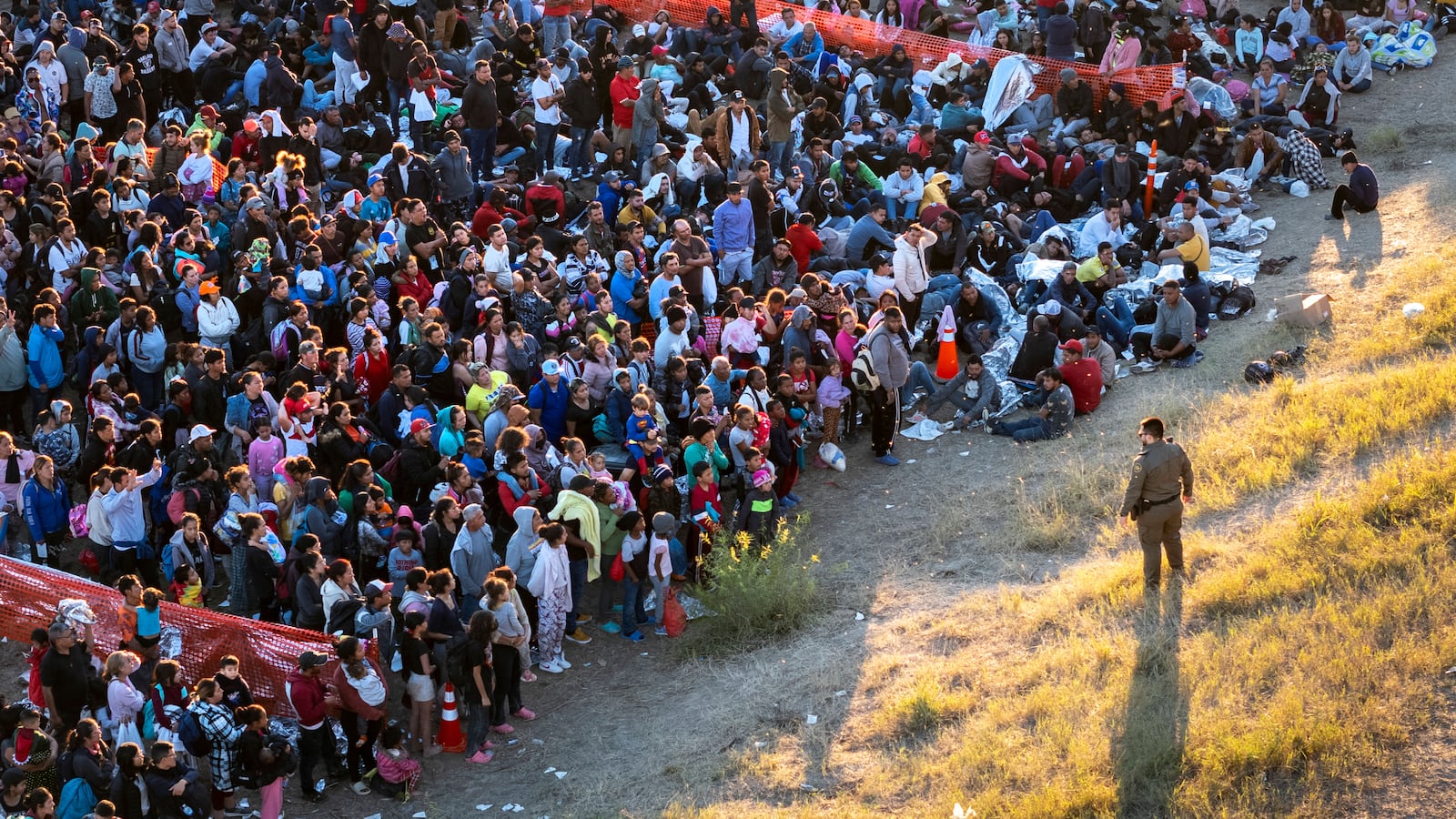Immigration is among the most wrenching political questions of the 2024 election. Yet, when Congress resumes debate on border security in January, the Congressional Black Caucus (CBC) has an obligation to act on behalf of its base. That’s because the Black community is disproportionately impacted by the current policy on immigration—and the unpredictable border surges of “asylum seekers.”
To date, the body of 60 members—three Senate Democrats, 55 voting House Democrats and two non-voting—has been missing in action. The skirting of duty is largely the result of being beholden to campaign money, business support, and Hispanic and progressive factions of the party. Now is the time for the dereliction to stop.
CBC members must shed their reticence and shine a spotlight on the mean correlation between the rising levels of immigration and the declining fortunes of Black workers, particularly men.
For example, the authors of “Immigration and the Economic Status of African-American Men,” a 2010 study published in the journal Economia, concluded, “We find a strong correlation between immigration, black wages, black employment rates, and black incarceration rates. As immigrants disproportionately increased the supply of workers in a particular skill group, the wage of black workers in that group fell, the employment rate declined, and the incarceration rate rose.”
In the years since, the surge of economic immigration has eroded the standing of Black labor even more. It caused T. Willard Fair)" href="https://urldefense.com/v3/__https://www.phillytrib.com/commentary/immigration-comes-at-a-devastating-cost-to-black-americans/article_00850999-e7aa-5e2e-9132-2b85d61821aa.html__;!!LsXw!Re98Yj-Aaq4rjeQCyB6rxRkwOFnfcmtOWKZyXntpxr-KkxlVw0gRMH_0MaUXtZJPGPw7nI-Sg9TLar_Gnmfs11rcplBcZtwWsA$">T. Willard Fair, President and CEO of the Urban League of Greater Miami, to write an op-ed in The Philadelphia Tribune where he questioned the pernicious loyalty of the CBC to the Democratic Party’s immigration policy:
“The lasting effects of uncontrolled, mass immigration on Black Americans are plainly obvious and have been well-documented throughout our country’s history,” he lamented in the March 2022 commentary. “So how can any Black politician in good conscience advocate for a more expansive immigration policy that would continue to do us harm?”
Clearly, the CBC has a duty to protect the interests of the over 18 million Black Americans it represents, even if it cuts against the grain of the party. No doubt this is a tricky subject for Black Democrats because many take pride in a legacy of supporting non-discriminatory immigration policy. The 1965 Immigration and Nationality Act, which opened doors for legal immigration from Asia and Eastern and Southern Europe, is among such civil rights accomplishments.
In addition, the CBC has expressed solidarity with the plight of immigrants as “people of color,” even though immigrants from predominantly Black countries account for about 575,000 of the estimated 11 million immigrants in the country illegally.

Dozens of migrant families are seen arriving from Texas at the Port Authority Bus Terminal in New York City early September 6, 2023.
Luiz C. Ribeiro for NY Daily News via GettyWhen Congress returns, the CBC must herald how their people are under duress from the helter-skelter border crossings, unclear enforcement policies, red state busing of asylum seekers to blue state sanctuary cities, unpredictable competition for jobs and housing, and lack of progress on immigration reform.
It means acknowledging the failure of the Biden administration to secure the border—but helping it to find a way forward. To start, it would be prudent to untangle the meaning of popular terms used by the press to describe the border dynamics. For example, most people on the border are permanent economic immigrants. As such, they are not “migrants” in the normal understanding of the word and should not be treated as such.
The term “migrants'' typically refers to a mass movement of workers within a country, such as the westward migrations of white farmers known as “Okies” during the Great Depression, or the relocation of Black sharecroppers to the urban factories during the world wars. Such is not the case for the economically distressed populations passing through Mexico, Central America, Venezuela, Cuba, and Haiti, as described by Project Hope, a non-governmental organization that assists health care workers with crises.
Rather than seeking political asylum, most are seeking to take advantage of legal loopholes to bypass the normal immigration process. They freely express a desire for access to work, housing, and permanent residency. They speak of wanting to take care of their families, even as their shortcuts threaten to torpedo American workers.
‘Taking from Peter to Feed Paul’
America’s history of favorable treatment for immigrants is a window on the status of race and labor in our culture. Black American workers have been diminished by pro-immigration policies ever since slave labor built the country into an economic powerhouse. For example, America used preferential land and labor enticements to recruit European immigrants in the mid-19th century.
The CBC would be prudent to link the security of Black labor to the best practices recommended for border security and immigration reform; namely, gaining control of the border, reducing illegal economic immigration, shutting down the red state busing activity, and establishing legal pathways to meet the demands of business for workers.
First, the CBC should push for inclusive standards for Black labor in skilled industries that attract disproportionate concentrations of immigrant workers. It might propose language that mirrors President Biden’s March 2022 executive order 14005 stating that the “Future is Made in All of America by All of America’s Workers.”
The CBC might offer similar language in the upcoming debates on immigration legislation—specifically, to prioritize the hiring and training of underrepresented American workers in civil construction. It would reinforce the equity provisions established by Congress in the infrastructure and clean energy laws.
The construction and manufacturing industries will receive a jump-start from the $500 billion Inflation Reduction Act)" href="https://urldefense.com/v3/__https://www.whitehouse.gov/cleanenergy/inflation-reduction-act-guidebook/__;!!LsXw!Re98Yj-Aaq4rjeQCyB6rxRkwOFnfcmtOWKZyXntpxr-KkxlVw0gRMH_0MaUXtZJPGPw7nI-Sg9TLar_Gnmfs11rcplDEO8i-xQ$">Inflation Reduction Act, the $1.2 trillion Infrastructure Investment and Jobs Act)" href="https://urldefense.com/v3/__https://www.whitehouse.gov/briefing-room/statements-releases/2021/11/06/fact-sheet-the-bipartisan-infrastructure-deal/__;!!LsXw!Re98Yj-Aaq4rjeQCyB6rxRkwOFnfcmtOWKZyXntpxr-KkxlVw0gRMH_0MaUXtZJPGPw7nI-Sg9TLar_Gnmfs11rcplBmUScScQ$">Infrastructure Investment and Jobs Act, and complementary investments from private companies. It will pay to reconstruct highways, bridges and tunnels, weatherize public buildings, install electric charging stations, construct electric battery plants and electric vehicle factories, and develop wind and solar power plants.
The projects will require the hiring and training of thousands of skilled workers, many without college degrees. Yet, Black labor historically has been excluded in civil construction)" href="https://urldefense.com/v3/__https://www.inquirer.com/news/inq2/more-perfect-union-trade-construction-racism-pennsylvania-20220830.html__;!!LsXw!Re98Yj-Aaq4rjeQCyB6rxRkwOFnfcmtOWKZyXntpxr-KkxlVw0gRMH_0MaUXtZJPGPw7nI-Sg9TLar_Gnmfs11rcplDGF3KHgA$">historically has been excluded in civil construction. Today, as a consequence, the racial demographic in the construction industry)" href="https://urldefense.com/v3/__https://www.bls.gov/spotlight/2022/the-construction-industry-labor-force-2003-to-2020/home.htm__;!!LsXw!Re98Yj-Aaq4rjeQCyB6rxRkwOFnfcmtOWKZyXntpxr-KkxlVw0gRMH_0MaUXtZJPGPw7nI-Sg9TLar_Gnmfs11rcplDdLPmEaw$">racial demographic in the construction industry is 60 percent white, 30 percent Hispanic, and 5 percent Black American, according to the U.S. Bureau of Labor Statistics.
In addition, sanctuary cities like New York are receiving large allocations of federal infrastructure funds. The city’s construction industry employed 374,000 people in 2020—and 53 percent were immigrants. By contrast, the unemployment rate of Black male workers was higher than any other ethnic group.
Second, the CBC should propose that sanctuary cities seeking bailouts from Washington be required to give the local population first dibs on facilities and services. The failure of authorities in such cities to prioritize their native underserved populations creates a dynamic of “taking from Peter to feed Paul” that is abhorrent.
Congress should require sanctuary cities to prioritize the local population for provisions such as homeless shelters, affordable housing units, emergency room and mental health services, education outreach, legal services, and food programs, among others. The populations from the border should have access to older facilities, if room is available.
Third, the CBC should call on the Biden administration to raise seed money for a reparations fund with the same urgency it has done for immigrants. Harris is campaigning on her success in raising $4 billion to help migrating immigrants in Central America. Why not utilize her fundraising prowess towards a development bank for the descendants of slavery and Jim Crow?
Finally, the CBC should demand that immigrants be required to learn about America’s struggle against racism and colorism. The colorism system of subtle discrimination based on fair complexions can be deeply rooted in the culture and practices of people from countries with colonial pasts. Black Americans should not be expected to endure the petty slights of color hierarchy with every new surge of immigration.
In closing, the CBC has an urgent responsibility to defend the needs of Black labor in the pending debates on border security and immigration reform. It would seem to be in the interest of both parties to hear them out.









